Welcome, reader, to our Tgmgo.com removal guide. The following instructions will aid you in removing the unwanted software from your PC.
Browser hijackers are a common source of browsing disturbance, and one of their latest representatives is the main accent of the removal guide below. Tgmgo.com is a typical browser hijacker component which usually imposes some undesired changes in the search engine and the homepage of the users’ default browser (Chrome, Firefox, IE, etc.) by redirecting their searches to various sponsored advertisements. This action, although not malicious, may cause some inconvenience and annoyance that’s why it is not surprising why some users are seeking for ways to remove Tgmgo.com from their PC. If you came to this page for the same, then in the next lines you are going to learn how to effectively uninstall this program and all of its traces from your system and restore your browser settings. We will also tell you more about the specifics of this type of software, the potential dangers it may expose you to and the possible methods to prevent it. So stay on this page to learn more.
What’s the purpose of Tgmgo.com?
Browser hijackers are famous for the annoying changes they may impose to the user’s browser and the excessive amount of advertisements they may display. Tgmgo.com is not an exception and the main purpose of that program is to redirect you to various types of ads, banners, pop-ups, sponsored pages and promotions. That’s why it may replace your homepage or change your default search engine and show you search results full of ads. These strange and probably undesired changes may seem suspicious. However, we should point out that this is not a virus or some nasty malware like Trojans, Ransomware or Spyware. Fortunately, browser hijackers are not programmed to do harm to your machine, nor can they “infect” you like the viruses do. In fact, the whole thing comes down to online advertising and its aggressive methods of displaying ads directly on the user’s screen in pursuit of more clicks and views. Very often, advertisers will pay for their ads to get clicked and browser hijackers such as Tgmgo.com are created with the sole aim to earn money for their developers through the clicks of such sponsored ads, or the so-called Pay-Per-Click method. It is debatable how fair this method is, but since it is not considered illegal either, many software developers and online businesses use it to gain profit. That’s why they may often include browser hijackers inside some free software installers, email attachments, freeware platforms, installation managers, or some non-paid apps and tool versions.
How did you get the hijacker on your browser?
You may not really recall when and how Tgmgo.com got inside your PC, but the chance is that you placed it there. This program usually gets installed along with some other program (mostly free one) which you willingly download and install on your PC. What you may not know is that it usually is bundled inside the installer and once you run it, especially if you don’t read carefully the EULA and simply proceed with the standard installation option, you will get it installed on the computer. This is a common thing that happens when users skip the advanced/custom option during the installation. Clicking that instead of the standard one gives them the opportunity to disable any additional software that may be bundled in the setup. This is exactly what we advise you to do in order to prevent the browser hijacker from getting installed. Once installed, however, this will not help you uninstall it and you may need a removal guide like the one below to fully remove the undesired program.
Can Tgmgo.com be a danger to your PC?
As we already said, Tgmgo.com is not a malicious program and its aim has nothing to do with file or system destruction, virus infection, or Ransomware encryption. However, there are some questionable activities, which some users may not really feel OK with. Apart from messing up the settings in their browser, some people may feel heavily annoyed by the constant flow of popping ads and page redirects. Their browser may become slower and it may seem like it takes forever to load the desired pages. The screen may freeze or get flooded with aggressive advertisements that seem impossible to close, which may add up to the annoyance. In this case, removing the hijacker may seem like the best option to stop the ads invasion. Moreover, whether you know it or not, this program may silently keep track to your online activity and your browsing history and collect your traffic data with the idea to expose you to more relevant ads. That’s why, if you want to permanently uninstall it, the removal guide below contains all the detailed steps for that.
SUMMARY:
| Name | Tgmgo.com |
| Type | Browser Hijacker |
| Danger Level | Medium (nowhere near threats like Ransomware, but still a security risk) |
| Symptoms | Replaced homepage, changed search engine, page redirects and dozens of ads on the screen. |
| Distribution Method | Software bundles, freeware platforms, installation managers, spam emails, torrents, direct downloads. |
Tgmgo.com Removal
I – Uninstallation
- Use the Winkey+R keyboard combination, write Control Panel in the search field and hit enter.

- Go to Uninstall a program under Programs.

- Seek the unwanted software, select it and then click on Uninstall
- If you are unable to spot Tgmgo.com, search for any unrecognized programs that you do not remember installing on your PC – the unwanted software might disguise itself by going under a different name.
II – Safe mode and revealing hidden files
III – Cleaning all your browsers
- Go to your browser’s icon, right-click on it and select Properties.

- Go to the Shortcut tab and in the Target make sure to delete anything written after “.exe”.

- Now, open your browser and follow the instructions below depending on whether you are using Chrome, Mozilla or IE.
- Chrome users:
- Go to your browser’s main menu located in the top-right corner of the screen and select Settings.
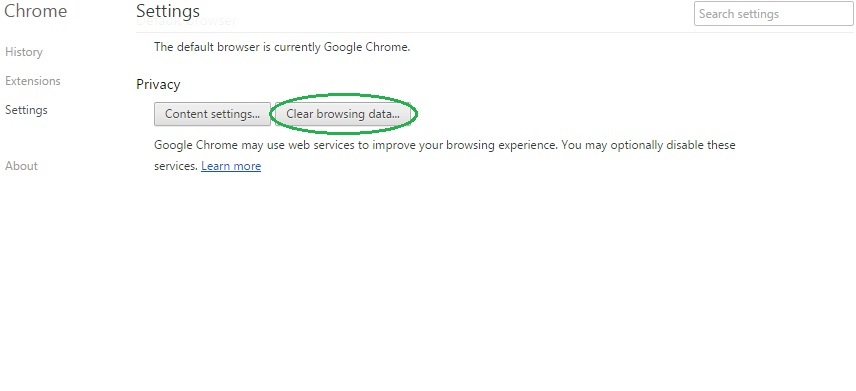
- Scroll down, click on Show Advanced Settings and then select Clear browsing data. Just to be sure, tick everything and clear the data.
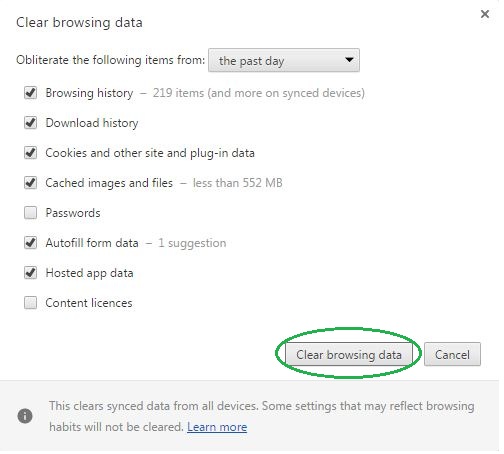
- Now, in the left pane, go to Extensions and look through all extensions that are integrated within your browser. If you notice any suspicious add-on, disable it and then remove it.
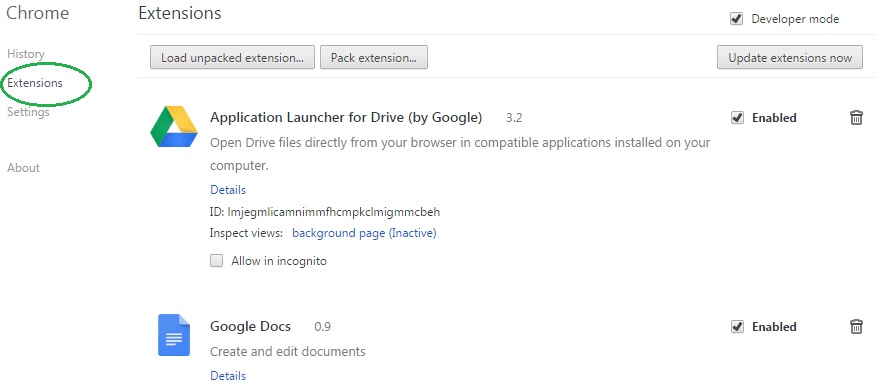
- Firefox users:
- Similarly to Chrome, go to the main menu and select Add-ons and then Extensions.
- Remove any suspicious browser extensions that you may have even if they do not have the name Tgmgo.com on them.
- IE users:
- Go to Tools and select Manage add-ons.

- Click on all add-on types from the left pane and check if there is anything suspicious in the right panel. In case you find anything shade, make sure to remove it.
IV – Removing Shady processes
- Go to your start menu, type Task Manager in the search field and from the results open View running processes with Task Manager.

- Thoroughly look through all processes. The name Tgmgo.com might not be there, but if you notice any shady looking process that consumes high amounts of memory it might be ran by the unwanted program.
- If you spot the process ran by Tgmgo.com, right-click on it, open its file location and delete everything in there. Then go back to the Task Manager and end the process.

V – DNS check
- In the start menu search box write View Network Connections and open the first result.
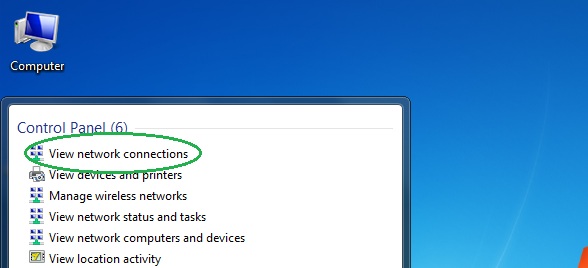
- Right-click on the network connection you are using and go to Properties.

- Select Internet Protocol Version (TCP/IPv4) and click on Properties.

- If Obtain DNS server addresses automatically is not checked, check it.
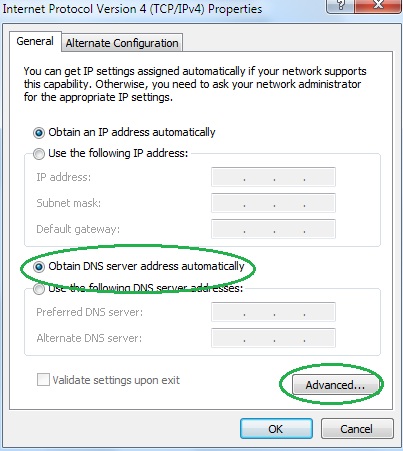
- Go to Advanced and select the DNS If there is anything in the DNS server addresses field, remove it and click OK.

- Click OK on the rest of the opened windows.





Leave a Reply